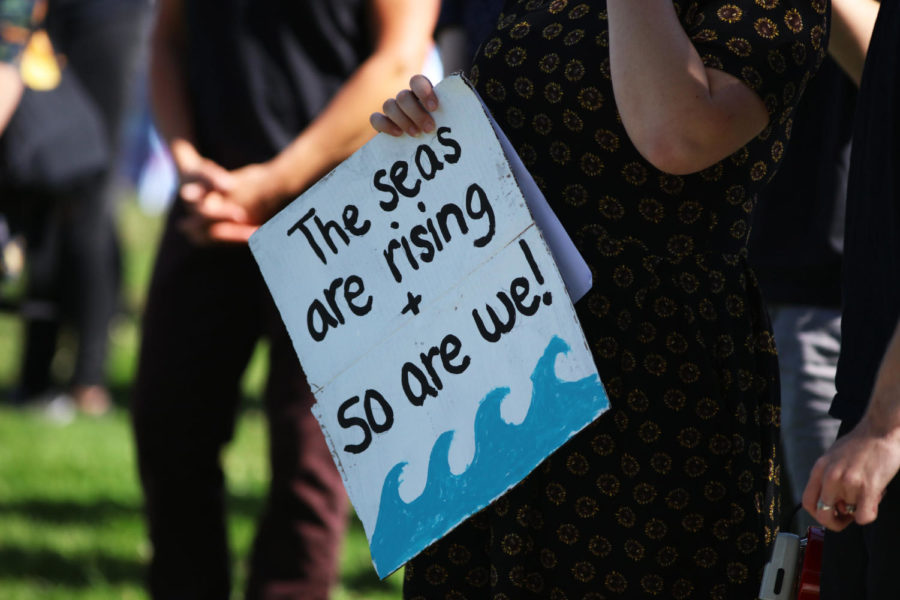Conservatives have a well-documented problem with environmental issues. Republicans, for instance, are far less likely to believe that climate change is real and caused by human activity than are Democrats. It doesn’t help that Republicans and conservatives as high-ranking as former President Donald Trump believe that climate change is a hoax invented by the Chinese to deter American economic growth. But public opinion among conservatives and Republicans differs by generation. Younger conservatives are far more likely than older ones to believe in climate change, and to believe that the government should prioritize mitigating it.
It may be wishful thinking to assume that conservatives will learn the error of our ways on this issue and start taking climate change more seriously. Our national politics are far too polarized for that, and top Republicans show little willingness to give the left any credit on such a hot-button issue. But doing so could offer a rare glimpse of bipartisanship while helping to stem the worse effects of climate change.
I will not attempt to persuade fence-sitters about the truth of climate change in this article. I will assume that climate change is real, although I disagree with some of the loudest voices on the left regarding the magnitude of the problem. Instead, I will highlight how conservatives can respond and already are responding to the challenge of climate change.
Indeed, there are many conservative environmental groups today. These groups acknowledge the problem of man-made climate change and advocate for conservative or market-based solutions. Many of these groups focus on cost-benefit analyses rather than on alarmist rhetoric, which they feel can help conservatives see this issue through the lens of fiscal responsibility. The group republicEn, for instance, consists of conservatives and libertarians who push free-market solutions to climate change. They propose a carbon tax, which puts a price on carbon emissions and incentivizes consumers to be more climate-conscious in their purchases. RepublicEn emphasizes that a carbon tax is revenue neutral, meaning that the tax imposed on carbon emissions would be offset by reduced taxes on other goods or services.
Moreover, this group speaks in a language that unites many conservatives: patriotism. “There would be no need for an international agreement; no bowing and scraping at the United Nations; no prolonged negotiations; just a bold move by the United States.”
The group Conservation Hawks takes a less explicitly political stance on climate change. This coalition of outdoor sportsmen is “devoted to protecting our sporting heritage and passing on a healthy natural world to our kids and grandkids.” While less policy-oriented, Conservation Hawks emphasizes to fishermen, hunters and others that climate change has deleterious effects on the habitats of the animal populations that hunters rely upon for sport. The founder, Todd Tanner, even offers fellow Montanans a free shotgun or fishing rod in exchange for actual evidence that climate change does not exist. This shows the creative power that conservatives (or outdoor sportsmen) can leverage into converting non-believers.
The American Conservative Coalition leverages something else: age. This group consists of young conservatives who want to make climate change a conservative—or, at least, bipartisan—issue. President and founder Benji Backer, 22, believes “that our generation [will solve climate change” via bipartisan actions. Backer emphasizes that the right can get on the climate change train by offering free-market, limited government solutions to combatting rising temperatures and carbon emissions.
Indeed, Backer explains that despite the partisan divisiveness often at the face of this issue, there still is common ground to be found: “Just because we have a different approach to solving climate change doesn’t mean that we are the bad guys, or that we’re evil. It just means that we have a different set of principles that we’re applying to solve the climate crisis.”
Tackling climate change doesn’t seem like a conservative issue. But that’s only because older conservatives abandoned the environmental movement in the 1980s and 90s. Indeed, conservatives and Republicans have historically sought to protect the environment. Richard Nixon, for instance, signed the Clean Air Act, the Endangered Species Act and the National Environmental Policy Act. He also created the Environmental Protection Agency. Moreover, Teddy Roosevelt, a Republican, championed national parks over a hundred years ago. This latter point is important: While climate change has become a partisan issue, preservation of nature does not have to be. Anyone who has visited a national park can appreciate nature’s beauty, and can agree that we should protect it, even at the expense of new industry. Protection of the natural environment indirectly necessitates action on climate change because rising sea levels, ocean acidification and increased surface temperatures all contribute to the destruction of our natural environment.
When we think of “conservative,” we often think of someone who wants to preserve existing traditions, laissez-faire economics and the American Constitution. There’s no reason we shouldn’t also conserve the environment.
Greg Fournier can be reached at [email protected].



















